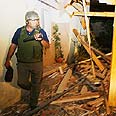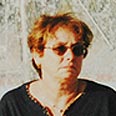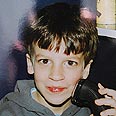
_A.jpg)
&91;5&93;_a.jpg)
_A.jpg)


500 Israelis injured since fighting began
About 700 Katyusha rockets fired at Israel, 500 citizens injured, four killed since fighting in northern border began. Home Front Command prepares for worst scenario – rockets reaching center of Israel; Lebanese report of more than 100 killed, hundreds wounded in IDF strikes
"The areas south of Haifa will be warned in advance by a siren," Home Front Command Chief Major-General Yitzhak Gershon explained Saturday evening, referring to a situation in which rockets will also reach the center of Israel.
"Once the siren is heard, residents will have at least one minute to enter lower floors and secure rooms. This will significantly reduce the ability to hurt people physically and mentally," he added.
The Home Front Command instructed residents of the northern confrontation line to also spend Saturday night in shelters. Residents were also called not to leave for work Sunday, not to gather in the city and not to open summer camps and hold activities for children.
Residents will be allowed to leave the secure zones in order to purchase necessary products according to instructions which will be given Sunday morning, the Home Front Command said.
Residents of the communities north of the Akko-Amiad road and the cities of Carmiel and Tiberias were called to stay in secure rooms or in an internal room in their house. People were allowed to leave for work only if their working place was located inside a closed building.
Residents of Tirat Hacarmel, Haifa, the Krayot, Nesher and Akko were called to remain next to buildings, not to gather, and to leave for work only if the working place is located inside a closed building.
56 still hospitalized
In the last 24 hours, more than 100 Katyusha rockets were fired at northern communities. The residents spent the entire day in bomb shelters. On Saturday afternoon, Tiberias joined the list of rocket-battered communities, but rockets did not only land there.
Nahariy and Safed were attacked once and again and suffered great damages. About 34 rockets hit Safed by Saturday afternoon, while 24 rockets landed in Nahariya. Dozens were hurt and some buildings suffered a direct hit.
Four civilians were killed since the fighting in the north began: A Nahariya resident, a Safed resident, and a woman and her grandson from Meron. The funerals of the two people killed in Meron – seven-year-old Omer Pesacov and his grandmother Yehudit Itzkovich – will be held on Sunday. The two were killed from a direct hit of a Katyusha rocket.
The Ministry of Health opened a situation room in Tel Aviv, which issues orders to the hospitals in northern Israel. The hospitals have treated more than 500 people since Wednesday, most of whom were released to their homes.
Four people in serious condition, 12 in moderate condition, and about 40 in light condition are still hospitalized. Health Ministry officials said that the hospitals are ready to receive the injured as long as it takes and that there was no shortage of medical teams or medical equipment.
On the Lebanese side, more than 100 people were reportedly killed and hundreds were injured across the country. Most of the wounded were hurt in the Israel Air Force's strikes on Beirut and south Lebanon.
Additional developments:
- The Israel Air Force on Saturday night struck Hizbullah's main headquarters in a southern suburb of Beirut. Hizbullah's television station al-Manar was also attacked.
- At around 11:10 p.m., Katyusha barrages hit Kiryat Shmona and the Mount Meron area. The rockets landed in open areas and there were no reports of injuries. About one hour later, additional rockets were fired at Meron. On Saturday, Tiberias
joined the list of Katyusha-battered cities.
- The Israel Air Force continued its war against Hizbullah strongholds
in Lebanon, attacking Beirut's coastal radars, Hizbulla's High Council building and the organization's headquarters in the Lebanese capital. The naval ports of Tripoli and Beirut were also struck.
- Lebanese Prime Minister Fouad Siniora promised
that if there is a ceasefire "we'll work to extend state's authority over all its territories, in cooperation with United Nations in south Lebanon." He admitted that "Lebanon is last to know what is happening, but first to pay price."
- Defense Minister Amir Peretz announced that a “special situation”
in the home front will be declared. The announcement will enable security forces to instruct the shutting down of schools, to operate essential industries and to close certain areas for traffic. The declaration is aimed at narrowing the damages of the expanding fighting in the north.
- An initial investigation
of the incident in which a Navy missile boat was hit off the Beirut shores reveled that the automatic interception system installed in the ship was not activated for fear it will hit Israeli aircrafts circling the area. Sources in the Navy said: "Had we known that Hizbullah possesses a missile like the one that hit the boat, we would have activated the system and moved away from the Israeli aircrafts.
Hanan Greenberg, Roee Nahmias, Ahiya Raved, Hagai Einav, Neta Sela and Sharon Roffe-Ofir contributed to the report















